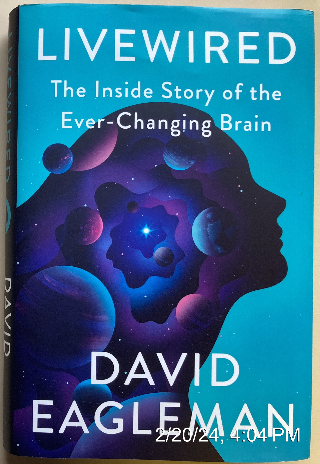-
David Eagleman, "Livewired"책 읽는 즐거움 2024. 5. 16. 10:58
.

David Eagleman, "Livewired: The Inside Story of the Ever-Changing Brain" (2020)
아래는 책에서
"[Y]our three pounds of brain tissue are not directly hearing or seeing any of the world around you. Instead, your brain is locked in a crypt of silence and darkness inside your skull. All it ever sees are electrochemical signals that stream in along different data cables. That's all it has to work with.
In ways we are still working to understand, the brain is stunnungly gifted at taking these signals and extracting patterns. To these patterns it assigns meaning. With this meaning you have subjective experience. The brain is an organ that converts sparks in the dark into the euphonious picture show of your world." (p. 54)
"As long as the incoming spikes carry information that represents something important about the outside world, the brain will learn how to interpret it. The vast neural forests in the brain don't care about the route by which the spikes entered." (p. 65)
"Plug in a new data stream, and the brain will figure out how to use it." (p. 89)
"Recall that our normal experiences are nothing but sensory input. So signals plugged directly into the brain can accomplish exactly the same ends. After all, all the signals impinging on our sensors are converted to a common electrochemical currency, so we could circumvent the sensors and create the electrochemical signals directly." (p. 98)
"Just like the drawing on the contact lens, the vasculature is fixed in position with respect to the retina. No matter how many movements your eyes make, they are never 'refreshing' the image of these blood vessels. Even though the vessels interpose themselves between you and the world, they perceptually disappear like a magic trick." (p. 165)
"Because of their active mental lives, their brains were forced to constantly build new bridges, even as some of their neural roadways were physically falling apart. In fact, a stunning one-third of the nuns seem to have had the molecular pathology of Alzheimer's without the expected cognitive sysmtoms. An active mental life, even in the very elderly, fosters new connections." (p. 204)
"The richness of our memory, I suggest, emerges through a biological cascade of time scales. New information builds upon the old, fitting into the constraints offered by previous experience." (p. 231)
"Take as an example the sensors that cover the body of a blind cave fish called the Mexican tetra: by detecting water pressure and flow, it can decipher the structures in the pitch-black water aroun it. Inspired by this, engineers in Singapore have built artificial versions of these sensors for submarines." (p. 235)
"[T]he main features of livewiring into seven principles." (p. 244)
"I express my deepest love and gratitude to my wife, Sarah, for being my support and bedrock and reinforcement. Although adoration usually lives in the domain of lyric poetry, it would be nothing without livewriring: our shared love has rewritten each other's brains." (p. 248, in Aknowledgments)
'책 읽는 즐거움' 카테고리의 다른 글
Henrietta Buckmaster, "Women Who Shaped History" (0) 2024.05.25 Éric Vuillard, "The Order of the Day" (0) 2024.05.17 N. Scott Momaday, "House Made of Dawn" (0) 2024.04.20 Penelope Fitzgerald, "The Blue Flower" (0) 2024.04.08 Nick Lane, "The Vital Question" (0) 2024.04.01